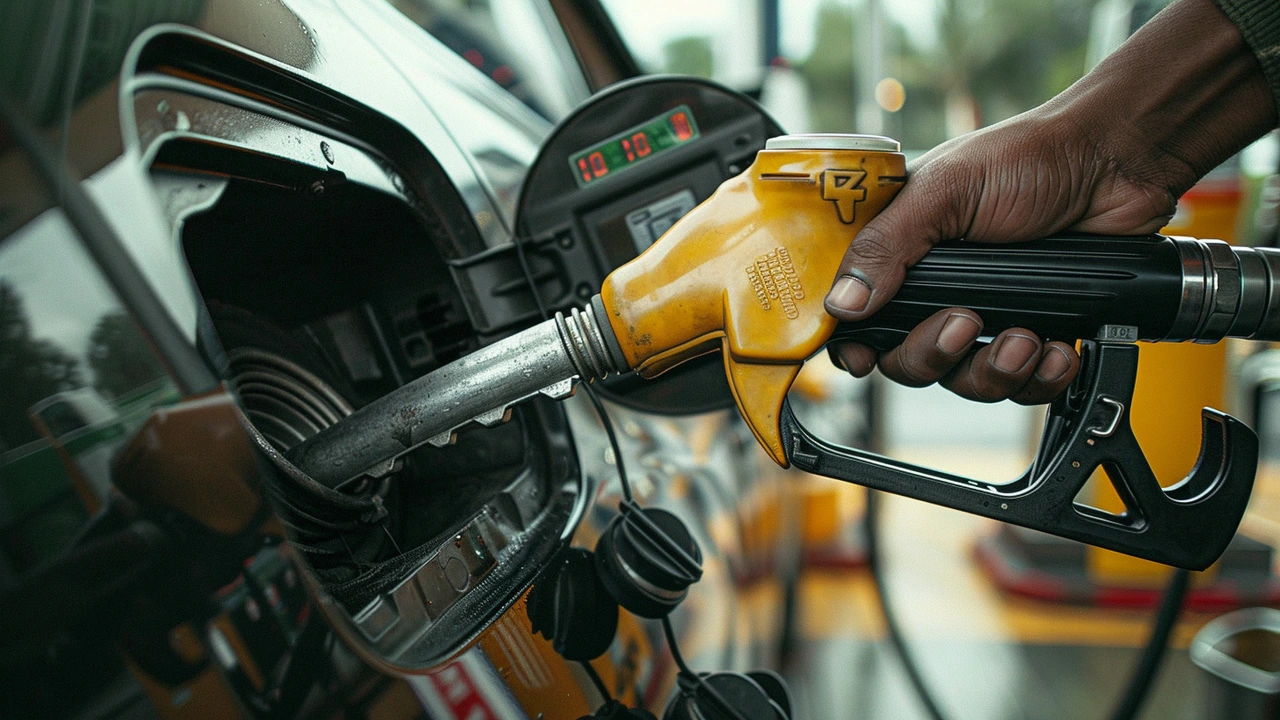Kenya's EPRA Announces New Fuel Pricing for May-June 2024
As households and businesses gear up for another month, they will find slight relief at the pump thanks to the new pricing adjustments made by the Energy & Petroleum Regulatory Authority (EPRA). Starting from May 15 to June 14, 2024, Kenyans can expect a decrease in fuel prices, a shift that subtly impacts the economy's overall vitality. The directive from EPRA states a reduction of Sh1.00 per litre for Super Petrol, Sh1.20 per litre for Diesel, and Sh1.30 per litre for Kerosene.
In Nairobi, the retail prices will be as follows: Super Petrol will cost Sh192.84 per litre, Diesel will be priced at Sh179.18, and Kerosene will go for Sh168.76. These adjustments are inclusive of the 16% Value Added Tax (VAT) which has been aligned with the protocols set out by the Finance Act of 2023 and the Tax Laws (Amendment) Act of 2020. The rationale behind these adjustments is a mix of fluctuating international oil prices and local fiscal policies aimed at stabilizing the domestic market.
Understanding the Factors Affecting Fuel Prices in Kenya
EPRA's pricing strategy is intricately tied to the global oil market dynamics, notably the prices sourced from benchmarks such as S&P Global Platts. For the month of April, the average landed cost of imported Super Petrol rose by 3.82% to US$765.87 per cubic metre from US$737.69 in March. This increase is contrasted by a marginal decrease in Diesel cost by 0.46%, while Kerosene saw a rise of 0.50%. These changes in the landed costs of fuel significantly impact the retail prices that consumers ultimately pay at the filling stations.
The fluctuation in global oil prices can often seem esoteric, yet they directly filter down to the day-to-day costs Kenyans face. The trading of these petroleum products in USD and the shifting USD-KShs exchange rate are additional crucial factors in this economic equation. These elements combined dictate the final retail prices in Kenya, making it a complex interplay of international and national economic forces.
EPRA's Role and Commitment
EPRA not only oversees fuel prices but also aims to ensure a balanced economic framework where fair competition and consumer interests are protected. According to EPRA Director General Daniel Kiptoo, the organization remains steadfast in its mission to monitor and regulate the sector, ensuring that importation and other prudently incurred costs are recovered fairly. This, he notes, is crucial in maintaining reasonable prices for consumers while safeguarding the interests of investors within the energy and petroleum sectors.
The necessity for regulations like the Petroleum Pricing Regulations is underscored by the need to cap the retail prices of petroleum products already within the country. This ensures that while the costs associated with importation and inflation are accounted for, the end consumers are not unduly burdened. It's a delicate balance to maintain, yet it is vital for the overall economic health of the nation.
Public Response and Economic Implications
The reduction in fuel prices, though seemingly minimal, has elicited mixed reactions among the Kenyan populace. While some citizens view the Sh1 decrease as negligible, others appreciate any reduction in fuel costs, particularly in an economic landscape that has been challenging globally. Discussions among consumers have highlighted the broader implications of even slight shifts in fuel pricing, pointing to the extensive impact of such measures on transportation costs, product pricing, and ultimately, the cost of living.
As Kenyans navigate through the complexities of economic adjustments, the role of EPRA becomes ever more crucial. Observing these changes and understanding their broader implications helps provide a clearer picture of Kenya's economic trajectory, especially in relation to global energy markets. Looking ahead, the interplay between local regulatory measures and global economic conditions will continue to define the scope and scale of fuel pricing strategies in the country.






Daisy Pimentel
May 14, 2024 AT 19:35The moment we accept a mere Sh1 reduction as progress, we surrender the ethical high ground that demands true economic justice.
Fuel prices are not just numbers on a receipt; they are a litmus test for how a society values collective wellbeing over corporate profit.
When EPRA trims the pump price by a token amount, it sends a subtle signal that the state is content with palliatives rather than systemic reform.
The moral imperative, therefore, is to scrutinize who truly benefits from such adjustments-are ordinary commuters, or the entrenched oil distributors?
History teaches us that superficial price cuts often mask deeper subsidies that enrich the few while keeping the masses in perpetual vulnerability.
Moreover, the reduction fails to address the root cause: the volatile reliance on imported crude that leaves the Kenyan economy at the mercy of distant markets.
A responsible policy would couple any price moderation with investments in renewable energy infrastructure, thereby reducing the import dependency.
By neglecting this broader vision, EPRA merely postpones the inevitable reckoning that any nation clinging to fossil fuels will face.
Citizens must therefore demand transparency on the cost structures behind these Sh1 figures, instead of passively celebrating a marginal win.
The government should publish detailed breakdowns of landed costs, tax revenues, and profit margins to illuminate where the real savings lie.
Only then can the public assess whether the regulator acts as a guardian of consumer interests or a conduit for industry appeasement.
Ethical stewardship also requires protecting the most vulnerable-those whose livelihoods depend on affordable transport for everyday survival.
A token Sh1 cut does little to alleviate the burden on low‑income families, who still allocate a disproportionate share of their income to fuel.
Real justice would entail tiered pricing schemes or targeted subsidies that directly uplift these communities.
Until such comprehensive measures are embraced, any minor price tweak remains a hollow gesture, and our collective conscience should not be soothed by its illusion.
Ellen Ross
May 19, 2024 AT 15:48Sure, because a single shilling magically solves the systemic inequities you just lamented. It's almost poetic how regulators love to hand out crumbs.
Fabian Rademacher
May 24, 2024 AT 12:00The real agenda behind the EPRA announcement is to keep us distracted while hidden contracts funnel billions to unknown offshore entities. These price tweaks are just smoke to mask a deeper collusion between the oil majors and political elites. They want us to think a Sh1 cut is a victory, while the real numbers stay buried in opaque spreadsheets. Trusting the regulator without demanding full disclosure is a dangerous gamble. Wake up and question who profits when the pump price inches down.
Terrell Mack
May 29, 2024 AT 08:13I hear you, man. The fuel market is a maze, but staying informed helps us navigate.
Dawn Waller
June 3, 2024 AT 04:26Oh great, another "shocking" price drop-just what we needed to solve all our problems!!!! Whoohoo!!
Grace Melville
June 8, 2024 AT 00:38Good point 😄
Ashlynn Barbery
June 12, 2024 AT 20:51The adjustment announced by EPRA, while modest, reflects an attempt to align domestic retail prices with volatile international benchmarks. In practice, this necessitates a careful balancing act between fiscal responsibility and consumer protection, especially given the prevailing exchange‑rate pressures. Regulatory transparency-such as publishing the underlying landed‑cost calculations-will be essential to maintain market confidence. Moreover, continued dialogue with industry stakeholders can help mitigate abrupt price swings that disproportionately affect transport‑dependent sectors.
Sarah Graham
June 17, 2024 AT 17:04Thanks for laying it out clearly; that helps a lot.
Jauregui Genoveva
June 22, 2024 AT 13:17Sh1? Really? 🙄
naman sharma
June 27, 2024 AT 09:29While the surface narrative paints the Sh1 reduction as a benevolent act, a deeper analysis reveals a strategic manipulation of public perception. The timing coincides with upcoming legislative sessions where energy subsidies are debated, suggesting a tactical concession to quell immediate discontent. Additionally, the disclosed figures omit the hidden cost of currency hedging contracts, which effectively transfer risk to the state treasury. In the long term, such opaque adjustments could exacerbate fiscal deficits, undermining macro‑economic stability. Policymakers would be wiser to pursue diversification of energy sources rather than rely on incremental price tweaks. Transparent reporting and stakeholder engagement are not merely procedural niceties but safeguards against the erosion of public trust.
Quinten Squires
July 2, 2024 AT 05:42People love to brag about a Sh1 drop, but the real story is hidden in the import tariffs and the exchange rate swing. EPRA’s role is mostly to keep the cash flow steady, not to solve poverty. If you look at the data, the subsidies barely move the needle for most commuters.
Tyler Manning
July 7, 2024 AT 01:55Our nation’s energy independence should never be compromised for a petty price cut. Let’s prioritize American‑made alternatives and keep the oil giants in check.
james patel
July 11, 2024 AT 22:08From a supply‑chain perspective, the marginal reduction aligns with the latest spot‑price de‑risking models. However, the elasticity of demand in the Kenyan market suggests limited consumer impact.
Scarlett Mirage
July 16, 2024 AT 18:20Interesting analysis!! However, the real impact is far less significant than advertised!!!
Ian Sepp
July 21, 2024 AT 14:33Noted.
Sweta Agarwal
July 26, 2024 AT 10:46Wow, groundbreaking.
Henry Cohen
July 31, 2024 AT 06:58These so‑called price cuts are just a smokescreen for the deeper collusion between regulators and multinational oil firms. The data shows that hidden fees and exchange‑rate buffers eat up any real savings for the consumer. Let’s not be fooled by the headline; the system is rigged to keep the profit margins intact. A critical eye reveals that the real beneficiaries are the same entities that have been lobbying for decades.
Mark Langdon
August 5, 2024 AT 03:11I get where you're coming from, but it's also worth acknowledging the complexities of global oil markets. Thanks for sharing your perspective.
Ciara Russell-Baker
August 9, 2024 AT 23:24Honestly, the whole discussion feels overhyped. A shilling here or there won’t change the bigger picture.
Aaron Samarita
August 14, 2024 AT 19:35Drama alert! EPRA's tiny tweak is being turned into a global crisis. Relax, folks.